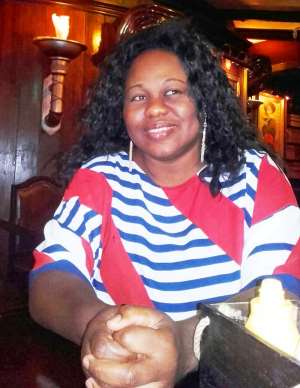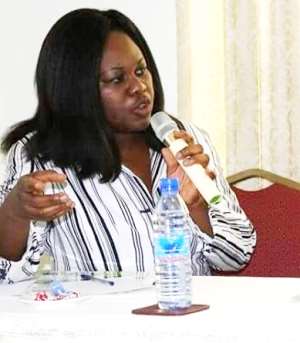Dr. Annie Gaisie, a Psychologist, is urging bars, restaurants, among other public hangout points, to either close their shops or not to sell large quantities of alcoholic drinks as Ghanaians vote on Wednesday, December 7th 2016, to choose the next crop of leaders to fill the legislature and the Presidency.
The concerned doctor wants this measure put in place for a number of weeks after voting and even into the Christmas season.
According to her, there are a lot of people out there who, under the influence of alcohol, can break loose and would try to use that to foment trouble even after the elections have been declared.

Though seven contenders are in the race in this year’s elections to grab Ghana’s hottest seat of government, the Presidency, political watchers have predicted a two horse race between the largest opposition party New Patriotic Party (NPP) under Nana Addo-Dankwa Akufo-Addo, and the ruling National Democratic Congress (NDC) led by President John Dramani Mahama who is seeking his second term.
A rather worried Dr. Gaisie was speaking in an exclusive interview with the ModernGhanaeditor.
“As Ghana’s Elections and Christmas party season get underway a sort of national anarchy is sweeping across the country, taking over the erstwhile Ghanaians and turning them into dangerous binge drinkers.
…It is always astounding the effect a bit of Christmas festive spirit and the results (outcome of elections) can have. As soon as the obligatory round of parties starts, instead of a few drinks to get merry, most people seem hell-bent on oblivion. And this is not only young people, it is professional men and women in their 30s, 40s and 50s.

…This is not to killjoy, but there is too much emphasis on booze during the party season. All we hear during Christmas and post elections is about starting fights, dangerous accidents, falling over, casualties and numerous episodes of domestic violence as a Christmas ritual.
Instead of alcohol being a pleasant facilitator, getting steaming drunk has become the sole reason to drink for millions. The line between having a drink and binge drinking is crossed all too frequently,” she said.
She went on to remind Ghanaians on some of the dangers of Alcohol intake and warned of a looming health hazard.
“You see, we become a nation of pie-eyed workers, swaying down the street, swigging back beer, Sprits, wine from a bottle and urinating against the wall.
Not only do hospital casualty departments fill up at this time of the year with people who have injured themselves after drinking too much. Binge drinking by young people is contributing to an increase in deaths before middle age.
….Our heavy drinking culture, which goes into overdrive at this time of year, is, according to some medical doctors and psychologists, going to do more harm. The horrifying truth is that respectable businessmen, middle-aged women and just about everyone else suddenly feels they can drink to excess and everything is alright.
….Health and Medical Research recommends a maximum of 2 standard drinks per day for healthy men and women to reduce the lifetime risk of harm from alcohol-related disease or injury.

….A standard drink contains approximately 10 grams of alcohol e.g. a 100 mL glass of table wine; a 60 mL glass of fortified wine; a middy of regular beer; or 30 mL of spirits. For healthy men and women, drinking no more than 4 standard drinks on a single occasion reduces the risk of alcohol-related injury arising from that occasion.
Avoid topping drinks up: you may lose count of how many you have had. .Try to alternate water or a non-alcoholic alternative with your alcoholic drinks, or try a non-alcoholic cocktail for a refreshing change. Learn how to say no and encourage your friends to be supportive. Remember that some beverages will contain more than one standard drink. Take this into account when calculating your intake for the evening, particularly if you are driving.”
The Psychologist further indicated that alcohol in general is removed from the blood at the rate of about one unit an hour but this varies from person to person and could depend on one’s size and gender.
“As men tend to process alcohol quicker than women; how much food you’ve eaten; the state of your liver, and your metabolism (how quickly or slowly your body turns food into energy).
…Please avoid drinking on an empty stomach. Having food in your stomach helps slow the rate that alcohol is absorbed into the bloodstream. Eating can also slow your rate of drinking, but avoid eating too many salty party snack foods which can encourage you to drink more quickly.
…If you are having problems saying no to alcohol, talk to your doctor for support. To keep health risks from alcohol to a low level, medical advice is, it is safest not to drink more than 14 units a week on a regular basis.
If you regularly drink as much as 14 units per week, it’s best to spread your drinking evenly over three or more days. Whether it’s okay to drive the next morning depends on how much you’ve drunk – and if you’ve left enough time for your system to get rid of the alcohol.
Note that the amount of alcohol in your bloodstream depends on three things, the amount you take in, over what period of time and the speed at which your body gets rid of it.”
Follow Doctor Gaisie Via These Social Media Networks:
Dr. Annie Gaisie
Facebook: Annie G Mental Wellbeing
Twitter: Annie G
Instagram: Annie G
Linkdln: Annie G
Email: dovewomen@gmail.com




